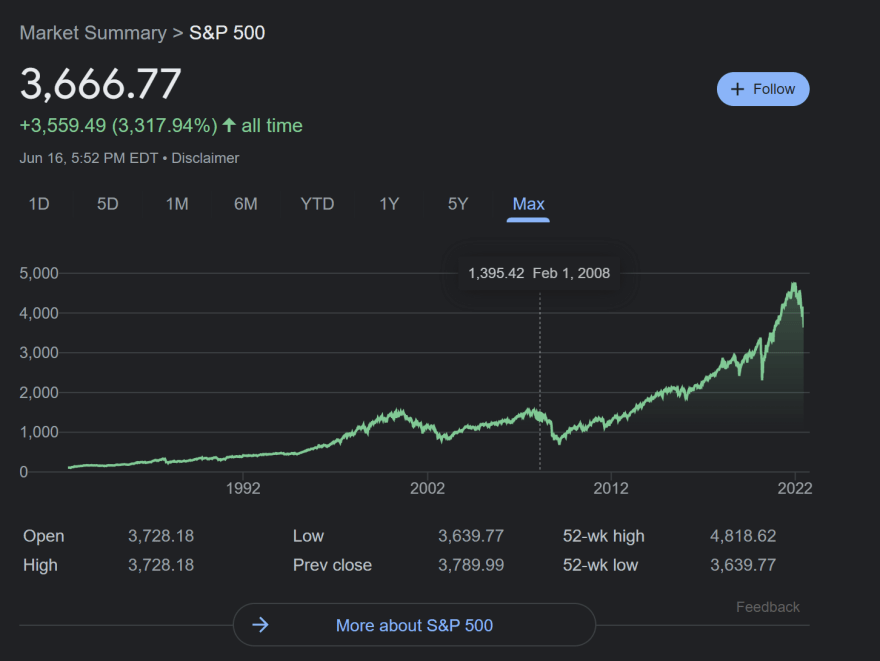This post is about how to achieve financial independence as a software engineer. Admittedly a clickbait title, but now please stay awhile and listen.
We're entering what will likely be a pretty sharp recession. The fed has raised interest rates, growth-focused stocks, particularly tech stocks have fallen like a piano, and inflation is at an all-time high. This article is how to use that to your advantage.
Firstly, why you should listen to me. I could honestly say that I'm a Silicon Valley Entrepreneur, and have made, lost and made again fortunes. However, the real reason you should listen is that I'm just a lazy schmuck that's figured out at least a little bit how to make things work.
My family never talked about money. We never talked about how to invest, never talked about compound interest or where to find it. I was in the fifth grade talking to a classmate and he was looking up things he was going to buy with the stock dividends he was making. It took me a decade to even know what on earth he was talking about.
We're all very busy people. I know I don't have time to be studying all the ins and outs of investing. That's why a lot of times as young professionals we're approached by financial managers. They will buy you lunch in order to give their pitch, they'll kiss your butt and somehow convince you to give your money to them with their promises to multiply your money.
Here's the funny thing about that. You know they charge fees for their services. You only assume that those fees are won back many times over by their expertise. Expertise in what? Predicting the future? Nobody can do that. Your money goes into a big pool where it's distributed in various ways you're perfectly capable of investing in yourself after an hour of research.
You're familiar with the phrase in gambling, "The house always wins." This is based on discreet math. Casinos make sure that the expected value of every game they have is over 50% in their favor. Enough time at the table you'll always lose. You might have a good night, a good week, or even a good month, but you'll always lose in the long run.
This is the opposite in the stock market. Yes you have winners and losers, but overall on a whole the stock market will make money. It's not gravity, it's not a Ponzi scheme, the stock market will always go up in the long run as long as companies are still making profits. If this weren't true the economy would collapse and the money you stuffed under the mattress would be about as valuable as toilet paper (which who knows, maybe that's a lot).
If you haven't heard of index funds, look them up. It's a way of investing in a diverse range of stocks. It's a way of "being the house" so to speak. VTI, which is the Vanguard Total Index fund, for example, has had an average return of 10% / year and 1.5% dividends for the last 40 years [citation needed]. This means if you invested 10K/year for 30 years you'd have about $2M [citation needed].
Compare this to your 401K. They have you make all the decisions anyway, so you're the one deciding what ratios of investment, whether that's money market accounts, stocks, etc. And then they charge you annually for each account, even if a human hasn't so much as looked at your account in decades. With long term investment, every fee and percentage point matters. Look at your 401K closely. Are you impressed with the 0.01% APYE yields and $150 recurring fees? Why do you even bother? Buying gold and burying it in your back yard would do better. Literally spending all your money buying Legos and making little Lego houses would give you better rates of return.
So what does this mean in a slump? In an imminent recession?
The crux of it is that neither you, nor anybody else, can predict the future. Well, kind of. You can make obtuse logical statements such as, "It will either go down indefinitely until money isn't worth anything anymore, or it will bounce back at some indefinite point in time."
Your 401K has no intelligence. You at least hopefully have the basic intelligence to buy low and sell high. Right now everything is on sale. Even if the market continues to slide for the next decade, because you're buying low, when there's the inevitable rebounds, you will make money.
If you liked my ramblings, I have another one brewing about self-funded development projects :)
GL HF
-Nick








Top comments (1)
An asterisk: If your employer offers 401K matching, take the free money. Always take the free money.